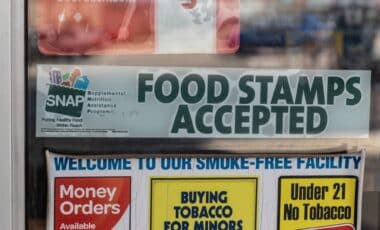The Department for Work and Pensions (DWP) said it has been reviewing thousands of pensioners’ bank statements following a significant increase in fraud.
Pension Credit Overpayments Surge to £520 Million, With Fraud a Major Concern
Overpayments of Pension Credit, a supplement for elderly persons on low income, increased to £520 million in the fiscal year ending April 2024, up from £330 million the previous year.
The excessive payments included £210 million in fraud, a significant rise over past year’s £120 million. Both increases were deemed as “statistically significant,” with under-declaration of financial resources and long-term abroad stays being the primary causes.
If you are over the State Pension age and have a low income, Pension Credit can help you with your living expenses. It can also aid with housing costs, wipe off some or all of a person’s council tax payment, and provide a free TV licence if you are 75 or older.
The DWP payment supplements your weekly retirement earnings to a minimum guarantee of £218.15 if you’re single or a joint sum of £332.95 if you’re in a relationship, with additional amounts available for individuals with children, impairments, or caring duties. It may also enable access to reduced expenses for NHS dental care, spectacles, and transportation fees for hospital appointments, and is amongst the qualifying benefits for the £150 Warm Home Discount payment each winter.
Government campaigns have motivated more individuals to apply, since it is estimated that up to 850,000 eligible households are missing out, with up to £1.7 billion in Pension Credit being unclaimed. However, records show a shocking increase in fraud among those receiving the benefit, owing primarily to claimants spending too much time overseas or failing to fully state the amount of savings they have hidden away.
Pension Credit has also experienced a “statistically significant” spike in fraud committed by people who falsely claimed to be single and failed to disclose that they were actually living with a spouse.
The Work and Pensions Committee recently heard that benefit overpayments increased by £1.4 billion, from £8.3 billion to £9.7 billion, in the previous fiscal year. According to the DWP, Pension Credit claims account for half of that rise.
Speaking to the committee, DWP Permanent Secretary Peter Schofield clarified: “It is not that we know what is going on with every single person who is claiming Pension Credit. Across the benefit system we do a sample of about 15,000 cases selecting a number of benefits that we do every year and some we do only now and again.
“Pension Credit is one that we looked at this year. We sampled a number of people who were claiming Pension Credit and we said: ‘Right, we are going to look at your claim. We are going to go through it. You are claiming on this basis for this amount. This tells us for example that you do not have income coming in from capital to a large extent. Let us understand that. We need to see your bank account.’
“Off the back of that sample, we will then identify a certain number of people within Pension Credit who are receiving an overpayment. We extrapolate that out across the whole of the Pension Credit caseload and the percentage of Pension Credit overpayment was 9.7 per cent.
“More than half of that was accounted for by capital, so people had more than they were allowed in terms of savings to claim Pension Credit or they were abroad for a period of time that you are not allowed to claim Pension Credit. That then played into our fraud and overpayment statistics.
“That does not mean that we know who all these people are. That is where the data powers that the Secretary of State was describing come in. This is where this committee and the Public Accounts Committee have held me to account regularly over the last few years, which is how do we start detecting more of the fraud and error that we know is out there? One of the ways we do that is through data.”
DWP Proposes Bank Monitoring for Welfare Claimants
The Department for Work and Pensions wishes to establish new powers to monitor all welfare claimants’ bank accounts. The idea is that banks and building societies would need to inspect for capital levels over the threshold for low-income benefits including, Pension Credit, Universal Credit, and Employment and Support Allowance (ESA), together with long periods of foreign transactions that indicate someone is staying abroad for longer than the rules allow.
The restrictions are part of the Data Protection and Digital Information Bill, which was not approved when Parliament was dissolved ahead of the General Election on July 4. It’s uncertain at this point if the intended legislation will be revived by the next government.
According to the most recent DWP numbers, errors made by Pension Credit claimants, such as providing false or incomplete information or failing to disclose a change in their circumstances, have increased from £160 million to a record-high £210 million.
In the meantime, DWP administrative errors accounted for an additional £100 million in overpayments, up from £60 million in 2022-2023. The majority were due to personnel making mistakes when assessing how much someone makes from personal or employment pensions.
What are the Pension Credit Rules for Travel and Savings?
People can continue to receive Pension Credit while overseas for up to four weeks, as long as they match the eligibility criteria. You can get Pension Credit for up to four additional weeks if you are abroad due to the death of a close relative, or if a close relative dies while you are gone and you cannot reasonably be anticipated to return to the UK.
If you have £10,000 or less in savings and investments, it will not affect your Pension Credit. If you have more than £10,000, each £500 over that amount counts as £1 in weekly income.
To be eligible for Pension Credit, you must live in England, Scotland, or Wales and have attained the State Pension age. When you apply, your income is calculated, and if you have a partner, your combined income is taken into account.
Your revenue includes:
- State Pension
- Other pension schemes
- Income from employment and self-employment
- Various social security benefits, like Carer’s Allowance
However, not all benefits are treated as income. Disregarded benefits include Adult Disability Payment, Attendance Allowance, Child Benefit, Personal Independence Payment, Housing Benefit, Council Tax Support, social fund payments such as Winter Fuel Allowance, and the DWP Christmas Bonus.









